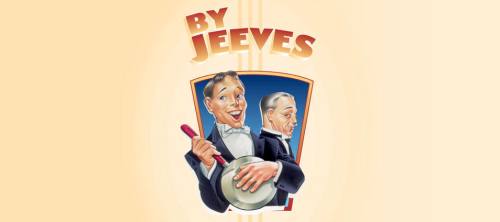
Based on the Jeeves novels by P.G. Wodehouse

Version 7
By Jeeves (2001-10-Helen Hayes Performing Arts Center-Broadway)
Type de série: RevivalThéâtre: Hayes Theatre (Broadway - Etats-Unis)
Durée : 2 mois
Nombre : 15 previews - 72 représentations
Première Preview : mardi 16 octobre 2001
Première : dimanche 28 octobre 2001
Dernière : dimanche 30 décembre 2001
Mise en scène : Alan Ayckbourn •
Chorégraphie : Sheila Carter •
Producteur :
L'une des bonne résolutions prise par Wodehouse lors de la nouvelle année 1905, alors qu'il était âgé de 23 ans, était d'apprendre à jouer du banjo, …
By Jeeves (revival title)
Le 22 Avril 1975, au théatre Her Majesty de Londres, c'est la première de "Jeeves" avec David Hemmings (Blow Up) dans le rôle de Bertie Wooster et Michael Aldridge dans celui de Jeeves.
Mais avant même la première, Andrew Lloyd Webber est conscient des problèmes qui parasitent la comédie musicale : trop de texte entre les chansons, un livret pas suffisamment drôle , des chansons peu inspirées, et surtout un spectacle trop long.
Les critiques, le lendemain de la première, sont assassines.
On remanie, on coupe, on tente de réparer les dégats, mais c'est trop tard, au bout de 38 représentations devant un public parsemé, "Jeeves" ferme ses portes le 24 Mai 1975, à peine un mois plus tard.
L'album qui sort deux mois après l'arrêt du spectacle, ne se vend bien évidemment pas.
C'est un échec retentissant, qui va marquer durablement Andrew Lloyd Webber, même si ce sera le seul et unique flop de sa carrière.
1 By Jeeves peut-être considéré comme un Flop musical
1975: Jeeves)
Tim Rice conceived the idea of turning P. G. Wodehouse's Jeeves stories into a musical. Originally, he was to work with his then-partner, Andrew Lloyd Webber, but Rice backed out of the project. Eventually Lloyd Webber teamed up with famed British playwright Alan Ayckbourn, and the two of them began work with the personal blessing of Wodehouse. Ayckbourn utilized characters and plot lines from several Jeeves and Wooster stories, notably-The Code of the Woosters. The action takes place at the East London Club for Unmanageable Boys, where Bertie Wooster is playing a banjo concert; his banjo keeps breaking down, so he is forced to tell stories to pass the time while Jeeves is sent off to fetch new strings. Bertie recounts how he managed to become engaged to three ladies simultaneously and how his valet Jeeves (through ingenious intervention) unravelled the complications.
Unfortunately, the loyalty to the Wodehouse material made for an epic length, (four and three-quarter hours at the Bristol tryouts) and reducing the duration made for creative tensions. Rows broke out about the presence of an all-male singing sextet accompanying Bertie Wooster and the realisation that the first woman did not appear on stage until thirty-five minutes had passed. Regardless of book-trouble, Lloyd Webber had provided a strong period score that eschewed all traces of the pop-inflections of his Jesus Christ Superstar. He seems to have lacked the confidence to orchestrate the score himself, so was prepared to pay for another's anonymous contributions. In the end, the sound of trumpets, banjos and saxophones flavouring this score were written by a group of arrangers: Keith Amos, Don Walker, Lloyd Webber himself and his future orchestrator, David Cullen.
The show opened in London on 22 April 1975 at Her Majesty's Theatre, starring David Hemmings as Bertie Wooster and Michael Aldridge as Jeeves. The role of Madeleine Bassett was performed by T.V. actress Gabrielle Drake. Other cast members included Debbie Bowen, Gordon Clyde, Angela Easterling, John Turner, Bill Wallis and David Wood. Actress Betty Marsden was cast as Aunt Dahlia, but the role and the accomplished actress were released before opening night.
The Director Eric Thompson (father of Actress- Emma) was alleged to be in over his head, trying to stage a small farce with a large group of singing chorus hanging around, near redundant. Thompson was fired just before the opening, so Ayckbourn himself stepped into the fray, aided by choreographer Christopher Bruce. It received mixed-to-poor reviews and closed after little over a month and 38 performances, on 24 May. Several critics noted that the authors failed to develop the title character, Jeeves not even having a solo song and unanimous condemnation of a long-winded and unfunny show. The original cast album (MCA Cat. No. MCF 2726) was recorded and released, but it is extremely hard to find. Lloyd Webber, reportedly acting on the advice of American Theatre Director- Harold Prince, withdrew the recording in order to be able to reuse some of the musical material in subsequent shows. Some London theatre fans tell (probably apocryphal) stories of Andrew Lloyd Webber going around London record shops to buy up the remaining copies of the album. The musical score does have some sprightly songs interwoven quite heavily into the plot.
1996: By Jeeves
Background : In 1996, Lloyd Webber and Ayckbourn decided to revisit the show, jettisoning most of the score and the entire original book. Retitled By Jeeves (so as to dispel all previous associations with the original production), the character of Roderick Spode and his fascistic intentions were eliminated from the plot. The character list was whittled down from 22 to 10, and the original orchestrations also underwent a reduction to a little band. Only three songs from the original show remained lyrically intact- "Banjo Boy", "Half a Moment" and "Travel Hopefully". The other songs and musical interludes were mostly new or reworked compositions by Lloyd Webber.
Productions : By Jeeves re-opened on 1 May 1996 at the Stephen Joseph Theatre-in-the-round in Scarborough, North Yorkshire, an English seaside resort. Audience reaction was generally enthusiastic so the show moved on 2 July 1996 to London for a 12-week season at the fairly intimate Duke of York's Theatre. The show turned out to be more popular than first thought, and the run was extended to February 1997 with the show moved to The Lyric Theatre in Shaftesbury Avenue.
Steven Pacey played Bertie Wooster and Malcolm Sinclair played his valet Jeeves. The Musical Director was Kate Young. The cast recording has an interesting format, taking a track between every song where Bertie and Jeeves discuss the plot. Pacey was nominated for an Olivier Award for Best Actor in a Musical, and By Jeeves also received nominations for Outstanding New Production and Best Costume Designer.
The show had its U.S. premiere on 12 November 1996, at the Goodspeed Opera House in Connecticut. U.S. actor John Scherer took the part of Bertie, and Richard Kline played Jeeves. The show was specially recorded and released on VHS and DVD where British actor Martin Jarvis took over from Richard Kline as Jeeves. It also had a brief run on Broadway at the Helen Hayes Theatre, from 28 October 2001 (in previews October 16) to 30 December 2001, for 73 performances. Directed by Ayckbourn, the cast featured Scherer (Bertie) and Martin Jarvis (Jeeves) (who received the Theatre World Award).
Aucun dossier informatif complémentaire concernant By Jeeves

Version 1
By Jeeves (1975-03-Bristol Hippodrome-Bristol)
Type de série: OriginalThéâtre: Bristol Hippodrome (Bristol - Angleterre)
Durée : 2 semaines
Nombre :
Première Preview : Inconnu
Première : samedi 22 mars 1975
Dernière : samedi 05 avril 1975
Mise en scène : Eric Thompson •
Chorégraphie : Christopher Bruce •
Producteur :
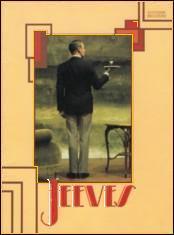
Version 2
By Jeeves (1975-04-Her Majesty's Theatre-Londres)
Type de série: OriginalThéâtre: Her Majesty's Theatre (Londres - Angleterre)
Durée : 1 mois
Nombre : 38 représentations
Première Preview : Inconnu
Première : mardi 22 avril 1975
Dernière : samedi 24 mai 1975
Mise en scène : Eric Thompson •
Chorégraphie : Christopher Bruce •
Producteur :
Commentaires : Le titre à l'époque était "Jeeves", tout simplement.
Terrible Flop. Le metteur en scène, Eric Thompson, est viré à quelques jours de la première.
Commentaires longs: The original cast album (MCA Cat. No. MCF 2726) was recorded and released, but it is extremely hard to find. Lloyd Webber, reportedly acting on the advice of American Theatre Director- Harold Prince, withdrew the recording in order to be able to reuse some of the musical material in subsequent shows. Some London theatre fans tell (probably apocryphal) stories of Andrew Lloyd Webber going around London record shops to buy up the remaining copies of the album. The musical score does have some sprightly songs interwoven quite heavily into the plot.
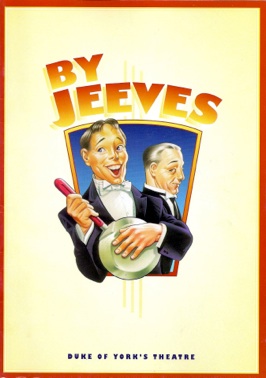
Version 4
By Jeeves (1996-07-London Run)
Type de série: RevivalThéâtre: London Run (Londres - Angleterre)
Durée : 7 mois 3 semaines
Nombre : 268 représentations
Première Preview : mercredi 26 juin 1996
Première : mardi 02 juillet 1996
Dernière : samedi 22 février 1997
Mise en scène : Kate Young •
Chorégraphie : Kate Young •
Producteur :
Avec : Steven Pacey (Bertie Wooster), Malcolm Sinclair (Jeeves), Simon Day (Gussie), Richard Long (Stinker), Lucy Tregear (Honoria Glossop), Cathy Sara (Stiffy Byng), Diana Morrison (Madeleinej, Nicholas Haverson (Bingo Little), Robert Austin (Sir Watkyn Bassett)
Commentaires : This was a completely revised version of “Jeeves”, the 1975 flop, re-titled “By Jeeves”. Instead of the large-scale original, the new version was a small-scale play with songs. Ayckbourn had thrown out the aunts and the pigs and all the other eccentric stuff and created an entirely new plot: Bertie intends to play his banjo at a charity performance at the local village hall but Jeeves hides the offending instrument. Andrew Lloyd Webber came up with eight new songs with five songs retained from the original. This time it was a success, described as “one of the slickest comebacks since Lazarus”. However, it still only managed just over a six month run:
24 Jun 96 to 28 Sep 96 Duke of York's Theatre, West End
3 Oct 96 to 22 Feb 97 Lyric Theatre, West End

Version 6
By Jeeves (1996-11-Goodspeed Opera House-East Haddam)
Type de série: RevivalThéâtre: Goodspeed Opera House (East Haddam - Etats-Unis)
Durée :
Nombre :
Première Preview : Inconnu
Première : mardi 12 novembre 1996
Dernière : Inconnu
Mise en scène : ???? ???? •
Chorégraphie : ???? ???? •
Producteur :

Version 7
By Jeeves (2001-10-Helen Hayes Performing Arts Center-Broadway)
Type de série: RevivalThéâtre: Hayes Theatre (Broadway - Etats-Unis)
Durée : 2 mois
Nombre : 15 previews - 72 représentations
Première Preview : mardi 16 octobre 2001
Première : dimanche 28 octobre 2001
Dernière : dimanche 30 décembre 2001
Mise en scène : Alan Ayckbourn •
Chorégraphie : Sheila Carter •
Producteur :
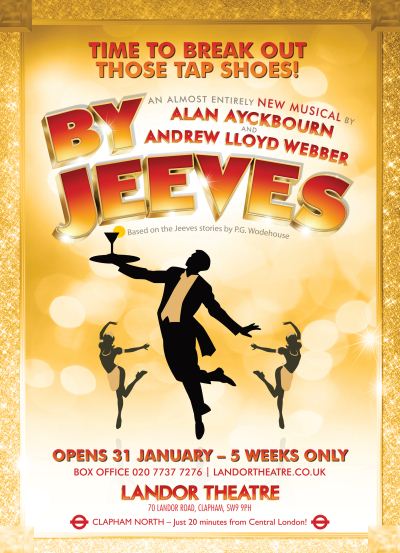
Version 8
By Jeeves (2011-02-Landor Teatre-London)
Type de série: RevivalThéâtre: Landor Theatre (Londres - Angleterre)
Durée : 1 mois
Nombre :
Première Preview : mardi 01 février 2011
Première : mardi 08 février 2011
Dernière : samedi 12 mars 2011
Mise en scène : Nick Bagnall •
Chorégraphie : Andrew Wright •
Producteur :
Avec : Cast: Kevin Trainor (Bertie Woosterj, Paul M. Meston (Jeeves), Andrew Pepper (Gussie), Brendan Cull (Stinker), Charlotte Mills (Honoria Glossop), Jenni Maitland (Stiffy Byng), Helen George (Madeleine), Owain Rhys Davies (Bingo Little), Tim Hudson (Sir Watkyn Bassett), David Menkin
Commentaires : This was a revival of the 1996 version - now the only version authorised for performance. Kevin Trainor received acclaim for his portrayal of Bertie, and the finale with some up-to-date references to Andrew Lloyd Webber’s current activities was greeted with hilarity. However, the rest of the show did not inspire much critical enthusiasm.
Pas encore de video disponible pour ce spectacle
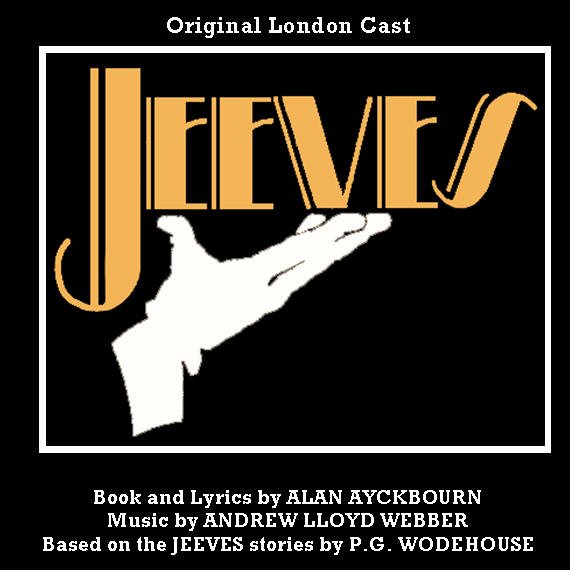
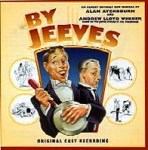

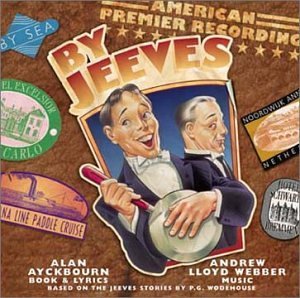

.png)
.png)




